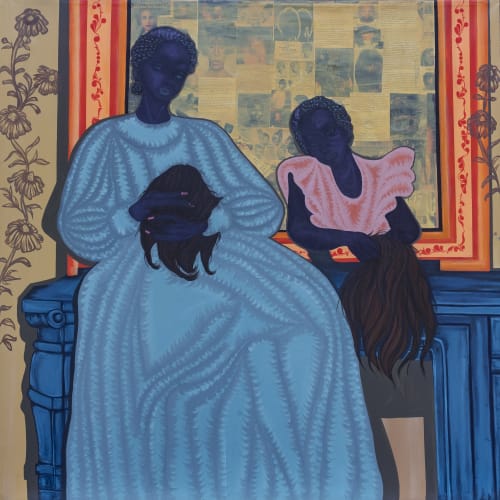What does it mean when we do not possess the aesthetic markers of belonging?
How do we perform through these expectations and how do we reconcile with our realities?
Who We Are When The Glory Is Gone is artist Jessica Soares’ debut exhibition of paintings, journeying through her own experiences with alopecia; a condition characterised by hair thinning and hair loss. The exhibition's title is spurred on from the reference of a woman's hair as crowning glory.
This body of paintings is an exploration of the in-between, the oscillation from how we present ourselves to the world against our actual realities. A kind of sense making of being void of said glory.
The works in this series play with wigs and scarves as objects of masking, figures adorned in brightly coloured Victorian dresses in performance of hyper femininity along with etchings of plants half dying and part blooming. The frames inside the frames become a symbolism for our preoccupation with image and the omnipresent hand mirror serves in duality as both confrontation and distortion.
Embedded inside the paintings are collaged stories and testimonials moving the work from the individual to the collective. A reminder of beauty as a collective burden. In the end, the artist produces a vivid, confrontational, and intimate spectre of paintings. A figurative yet surreal invitation into this state of limbo.
Though the works are inspired by the artist’s lived experience, the journey of hair loss becomes a point of departure into the larger themes of perception, the value of material aesthetics and the difficult task of making peace through iterations of being.
Belonging is fundamental to human desire. But to be seen as our full selves can sometimes be hindered by arbitrary markers. Soares’ work is also a provocation that asks us to see and allow for others to be seen without being burdened by these arbitrary standards.
Who We Are When The Glory Is Gone is a navigation of loss, a grieving if we must and reconciliation with self in a world that often doesn’t make room for us when we cannot meet its expectations.
Curator
Wana Udobang


